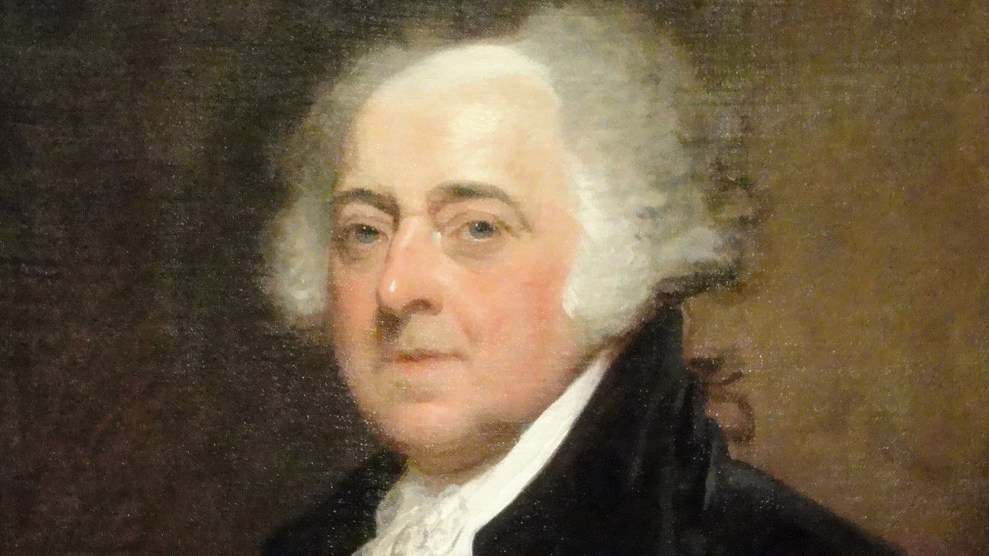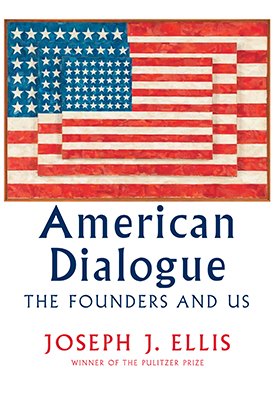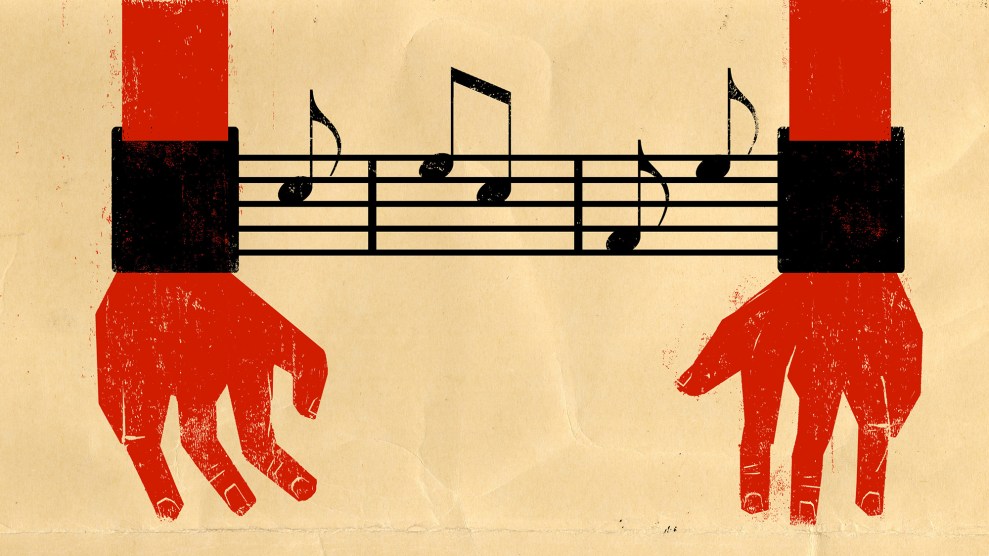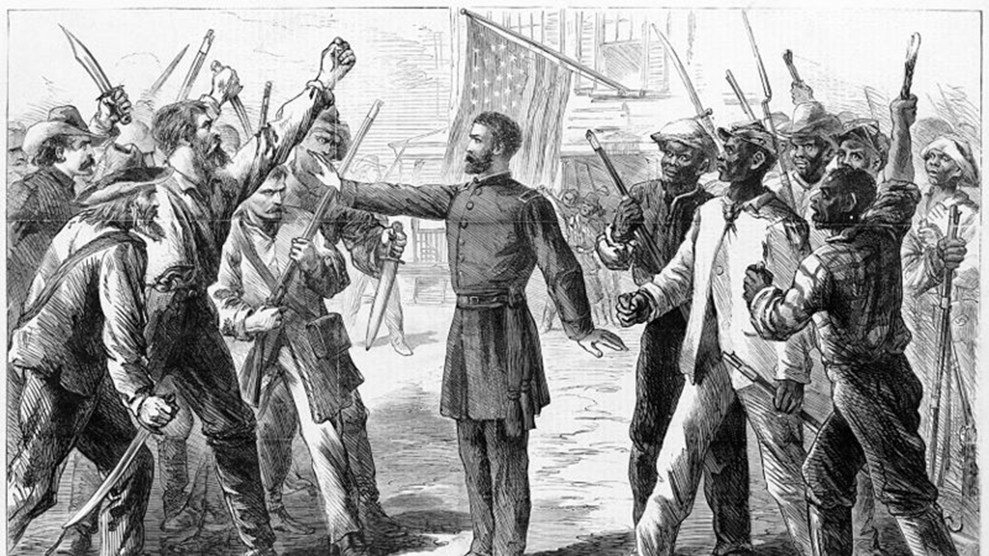
National Gallery of Art
During America’s first Gilded Age, in 1898, Sen. Mark Hanna was sufficiently candid when asked about his political principles. There are two political truths, the Ohio Republican observed: “The first is money. I can’t remember what the second is.”
Now, during our second Gilded Age, Senate Majority Leader Mitch McConnell has proved less forthcoming than his forebear, perhaps believing that actions speak louder than words. The tax bill his party shoehorned through Congress last December will add more than $2 trillion to the national debt, according to the Congressional Budget Office, and deliver the bulk of the windfall to the richest 1 percent of the citizenry.

Order the book from which this essay was adapted.
Deeply unpopular with the masses, the 2017 tax legislation was payback to the donor class for its largess in funding a congressional plutocracy—a closed loop of legalized graft enabled by the Supreme Court in its 2010 Citizens United case. This is not to mention the government’s rescue of Wall Street at the height of the Great Recession almost exactly one decade ago, and its abandonment of Main Street as collateral damage—nor the fact that the United States, which invented the concept of a middle-class society, now has the highest level of income inequality of any advanced society in the world.
Were John Adams alive today, he would be apoplectic. Indeed, the founder’s concerns about inequality and plutocratic government were the chief topics of a fevered exchange of letters between Adams and Thomas Jefferson during their twilight years, from 1812 to 1826. Adams set the agenda when he wrote, “You and I ought not to die, before we have explained ourselves to each other.” This was a warning that the ever-combustible Adams would be poised for eruption whenever Jefferson touched on a sensitive subject.
One such trigger point was Jefferson’s deployment of the loaded term aristoi—Greek for “the best”—which set off a spirited dialogue between the two men on the tensions between equality and aristocracy as it applied to the revolutionary generation. “Every one,” Jefferson noted in one letter, “takes his side in favor of the many or the few.”
“Precisely,” Adams returned. The clash between “the few and the many” was “as old as Aristotle.” But then he went on to complicate Aristotle’s categories. Adams’ chief heresy was his direct refutation of Jefferson’s most famous words, that “all men are created equal.” Perhaps in some lofty humanistic sense this was true, Adams wrote, but “Inequalities of Mind and Body are so established by God Almighty in the constitution of Human Nature that no Art or policy can ever plain them down to a level.” Aristocracies, he therefore insisted, were an inevitable and permanent fixture in all human societies—including the young republic he and Jefferson had helped into being.
Jefferson wrote back to suggest his friend’s argument was true of Europe, where feudal privileges, inherited titles, and limited economic opportunities created conditions that sustained class distinctions. In America, though, the absence of laws such as primogeniture and entail, and the existence of an unspoiled continent, meant “everyone may have land to labor for himself as he chooses,” and thus enduring elites were unlikely here. Given such favorable conditions, Jefferson argued, it was reasonable to expect that “rank, and birth, and tinsel-aristocracy will finally shrink into insignificance,” resulting in a roughly egalitarian, middle-class society.
Adams was unconvinced. “No Romance could be more amusing,” he replied, than the belief that the United States would prove an exception to the dominant pattern of economic inequality throughout history. “As long as Property exists,” he observed, “it will accumulate in Individuals and Families…the Snow ball will grow as it rolls.” Even philosophers, when marrying off their children, Adams chided, “prefer the rich and handsome and the well descended to the wise and the good.” There were “five Pillars of Aristocracy,” he concluded, “Beauty, Wealth, Birth, Genius, and Virtues. Any one of the three first can, at any time, overbear any one or both of the two last.”
At the same time he was corresponding with Jefferson, Adams received a 600-page manuscript from John Taylor, a Jefferson disciple who had served in the Senate while Adams was vice president. “Taylor was an eternal talker,” Adams recalled, “the greatest talker I ever knew, excepting George the Third.” Taylor had apparently been spending his retirement on his Virginia plantation fretting over A Defence of the Constitutions of Government of the United States of America, a three-volume work Adams had written decades earlier. “I thought my books as well as myself were forgotten,” Adams joked to Jefferson, “but behold! I am to become a great man in my expiring moments.”
The Defence was very much a product of the 1780s. Adams had been appointed America’s first minister to the British court in 1784 and subsequently found himself denied access to relevant officials and therefore with little to do. So he set to work on a treatise aimed at an American audience that was preoccupied with framing state constitutions, and that, by 1786, was contemplating a national constitutional convention. It was a propitious moment, and Adams was heartsick at missing it. The Defence, which described his preferred system of government, was his way of projecting his influence across the Atlantic to safeguard his precious revolution.
Adams favored an all-powerful executive he called “the first magistrate”—an elected monarch with unassailable veto power over the legislature. When critics suggested that Adams had acquired a fondness for royalty during his time in Europe, he retorted that the first magistrate would occupy an elected rather than a hereditary office. He insisted that only such an executive—which 20th-century historians called an “imperial presidency”—would provide the stability required of a large republic.
It was oligarchy Adams worried about. “In every society known to man,” he wrote in Defence, “an aristocracy has risen up in the course of time, consisting of a few rich and honorable families who have united with each other against both the people and the first magistrate.” There were few universal principles in Adams’ political universe, but this was one of them: All societies eventually produced social and economic elites that, left unchecked, achieved political domination at the expense of everyone else. “You are afraid of the one, I, the few,” he wrote to Jefferson.
Adams felt that the obsessive American fear of monarchy was misguided, because the prevailing historical pattern was for monarchs to defend the masses against rule by “the few.” (This interpretation, according to European historians, was mostly true.) “The executive is the natural friend of the people,” Adams wrote, “and the only defense which they or their representatives can have against the avarice and ambition of the rich and distinguished.” This ever-present danger, he believed, demanded constant attention from all branches of government. (Adams’ solution to the aristocracy problem was laughably weird, derived from a book whose author had intended it as a rationale for England’s House of Lords. He proposed that aristocrats be given puffed-up titles and placed in the Senate, an arrangement “that is to all honest and useful instincts, an ostracism.”)
Taylor, like Jefferson, viewed Adams’ categories—the one, the few, the many—as anachronisms. Post-revolution, he claimed, words like “aristocracy” were little more than offensive irrelevancies. “That all men are born to equal rights is true,” Adams admitted in a rebuttal letter. But to believe that “all men are born with equal powers and faculties and equal influence in society,” he wrote, “is as gross a fraud as ever was monks, by Devils, by Brahmins, by priests of the immortal Lama, or by the self-styled philosophers of the French Revolution.”
And how was it, Adams queried Taylor, that a slave-owning Virginian who had married into a “handsome fortune” was lecturing the son of a New England farmer about equality? “If you complain that this is personal,” he observed, “I confess it and intend it should be personal, that it might be more striking to you.” Taylor was just the kind of privileged aristocrat Adams was talking about—one whose plantation of enslaved blacks directly contradicted his rhapsodies about America as the land of equality.
The two men found common ground, however, over what Taylor called “finance capitalism.” Like most of Virginia’s planter class, Taylor was heavily in debt to British bankers, and he had embraced the conviction that banks were places you sent your money to disappear based on some principle of magic called compound interest. The banking system, he believed, consisted of diabolical swindlers who manipulated interest rates to make “a minority of [the] nation rich and potent, at the expense of the majority, which it makes poor and impotent.” Taylor’s view of banks as snakes in the American Eden found favor a few years later when Andrew Jackson targeted them for removal, along with the Native Americans east of the Mississippi.
Adams was a northern Federalist who had overseen Senate debate over Alexander Hamilton’s proposal for a National Bank. Even so, he insisted no one hated the banks more than he did: “Our whole banking system I ever abhorred, I continue to abhor and shall die abhorring,” Adams thundered to Taylor. His dying regret, he wrote, would be to exit life in a “bebanked, bewhiskied, and bedollared nation.” It was clear that both men viewed bankers as inherently immoral, in part because they made huge amounts of money without doing any productive labor, and in part because they transferred wealth from the middling and poorer classes into the hands of the already rich.
How, then, to deal with this pox on the economic landscape of early America? Taylor’s proposal was to liberate the agrarian economy by severing the connections between banks and government. But Adams recognized that the banks performed a valuable role in establishing credit and stabilizing currency. Like the aristoi, they were a dangerous fact of life. “An attempt to annihilate them would be as romantic an adventure as any in Don Quixote,” he warned—which came pretty close to saying they were too big to fail.
His solution was the opposite of Taylor’s. Adams wanted to turn banks into public institutions and place them under the control of Congress. There should “be one Bank in the United States, and that a National Bank with a branch in each state,” he wrote. “This ought to have been a fundamental Article in the Constitution.” Adams’ views, which anticipated the Federal Reserve Board and the banking regulations of the New Deal, were all in keeping with his conviction that the new aristocracy could not be killed, so it must be controlled.
Ironically enough, the reasons Taylor cited to accuse Adams of irrelevancy in his time make him especially relevant in ours, for by clinging to his classical categories—the one, the few, the many—Adams anticipated the structural inequality and plutocratic politics of now. His heresy has become our prophecy.
In 1790, he had published a book called Discourses on Davila, a collection of articles that set out to explain what motivated American’s elite to amass wealth and utilize it in ostentatious displays of superiority. The psychological goal, he theorized, was to be noticed and loved. “Riches force the opinion on man that he is the object of the congratulations of others,” Adams wrote. “His imagination expands, and his heart dilates at these charming illusions. His attachment to his possessions increases as fast as his desire to accumulate more; not for the purposes of utility, but from the desire of illustration.”
Adams never used the word “capitalism,” but he did describe the emerging nation as a “commercial republic” in which the quest for material rewards would dominate and define what subsequent generations meant by “pursuit of happiness.” (Jefferson had intended something different.) It followed that wealth would become the defining characteristic of the American aristocracy, which would then use its powers to wrest control over political institutions to serve its own interests and agenda. That is precisely what happened during the first Gilded Age, and it is happening again in this one.
Adams’ fear that entrenched economic inequality would lead to oligarchy made him the revolutionary generation’s most ardent opponent of the Jeffersonian version of American exceptionalism. Indeed, when his finely tuned antennae picked up hints that he and his fellow revolutionaries were being canonized in the public mind, he would have none of it. Adams, of all people, could testify to the fact that the founders were fallible creatures. He bemoaned “the pilgrimages to Mount Vernon” and, in an 1812 letter to Benjamin Waterhouse, admonished all who might call him “‘Godlike Adams,’ ‘The Father of His Country,’ ‘The Founder of the American Republic,’ or ‘The Founder of the American Empire.’ The titles belong to no man.”
Adams’ generation sought distinction by pursuing fame rather than fortune—the former was certainly the driving force in Adams’ own life, and he expected that at least a small percentage of the wealthiest Americans would seek satisfaction by trading their private fortunes for public renown by way of grand philanthropic ventures. In effect, he anticipated the emergence of Andrew Carnegie and John D. Rockefeller during the first Gilded Age and Warren Buffett and Bill Gates in ours. And because fame trumped fortune in his emotional sweepstakes, Adams predicted that wealth would never completely overwhelm commonwealth.
How far Adams was prepared to go beyond that modest level of hope is difficult to know. He is distinctive within the revolutionary generation for calling attention to the faults of the Jeffersonian creed, which presumed the compatibility and coexistence of equality and freedom. Adams insisted that the freedom to pursue one’s happiness in the marketplace ensured the triumph of inequality. His argument, in retrospect, exposes the illusion that equality is the natural order that can be recovered by a “reset” of the economy—or that the victims of income stratification have no one to blame but themselves.
We can be confident that Adams rejected the socialistic solution, which he encountered in pre-revolutionary Paris. He correctly predicted that any effort to do away with private property would create a society of paupers under an oppressive totalitarian state. But the reforms he proposed to constrain aristocratic domination—isolate the elite in the Senate and create honorific titles to offset the allure of wealth—were as grossly inadequate then as they are now.
As we grapple with the ongoing failure of our economy to distribute wealth in accord with our egalitarian expectations, Adams’ legacy remains valuable nevertheless, for it helps us frame our analysis more historically and realistically. For once you realize that equality is the exception, not the rule, in a capitalistic society, the question changes. It is not “How can we free the marketplace from government regulations and increase productivity?” It is instead, “How can we free ourselves from our illusions about the free market in order to assume a more equitable distribution of wealth?”
Adams invites us to think about the meaning of the word “republic,” from the Latin meaning “public things.” Do we believe, as he did, that there is a public interest beyond the reach of markets and majorities of the moment? Are we a society composed of winners and losers, givers and takers, or is there some larger status we share collectively as citizens?
These are the questions Adams posed, in his cantankerous way, for posterity—which now, more than ever, is us.
This essay was adapted from Joseph J. Ellis’ new book, American Dialogue, published on October 16 by Knopf.
















